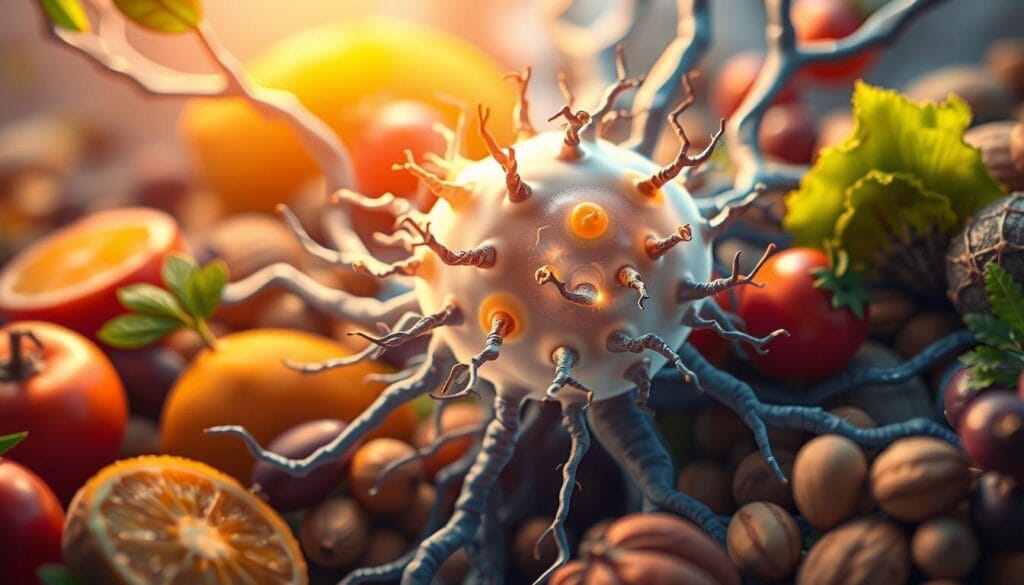Peripheral nerve injuries hit over one million people worldwide each year. They cause big problems and high costs in healthcare. While there are treatments, getting back to normal is hard.
But have you ever wondered why some people bounce back from nerve injuries faster than others? Or why tingling, numbness, or weakness sometimes takes months to fade?
The secret isn’t always surgery or pills. One key factor that often goes unnoticed is nutrition for nerve regeneration. Yes, what you eat can decide how quickly (and how well) your nerves recover.
Your nerves are the communication lines of your body. When they’re damaged, you lose the signal. It could mean pain, weakness, or worse. But with the right nutrition for nerve regeneration, your body has the tools it needs to rebuild these important pathways.
In this blog, we’ll explore how to use nutrition for nerve regeneration, what to eat, what to avoid, and how to boost your nerve health for the long term
Table of Contents
ToggleUnderstanding Nerve Regeneration
The human body’s nerves can get hurt from daily activities or big accidents. Fixing nerves involves growing new nerve fibers and making connections again. How well nerves heal depends on the injury, age, health, and nutrition for nerve regeneration.
Read → Neurologist-Backed Natural Remedies for Improving Nerve Strength
What Happens When Nerves are Damaged?
Nerves carry messages from your brain to your body and back again. Damage can mess up this flow.
- The nervous system has two parts: central (brain/spinal cord) and peripheral (arms, legs, organs).
- Peripheral nerve damage can lead to numbness, weakness, pain, or loss of function.
- Causes include injuries, diabetes, poor circulation, infections, or toxins.
When a nerve is cut or compressed, it tries to repair itself. But healing damaged nerves depends on how badly it’s hurt, and what support it gets.
The Basics of Nerve Repair
Your body has a natural way of fixing nerves. This is called neuroplasticity and nerve regeneration.
- Neuroplasticity lets your brain reroute signals when one path is blocked.
- Nerve cells try to regrow the axon (the signal wire).
- But without proper nutrients, the process slows down or fails.
- Recovery can take weeks, months, or years.
“Peripheral nerve injuries affect over 20 million people in the U.S. alone.” — National Institute of Neurological Disorders and Stroke.
Regeneration can happen, but your body needs the right nutrition for nerve regeneration.
Factors Influencing Nerve Healing
Many things can affect how nerves heal. The injury’s type and how bad it is matter a lot. Younger people usually heal faster. Also, being healthy and eating right helps a lot.

Eating well is key for nerve health. Nerves need vitamins and minerals to work well. Knowing how to help nerves heal can make a big difference.
How Nutrition Affects Nerve Regeneration
Your diet can either help or hurt your nerves. That’s the truth. nutrition for nerve regeneration is not optional, it’s essential.
The Role of Micronutrients in Nerve Health
Nerves need specific nutrients to repair themselves. They use these nutrients to build the myelin sheath (the nerve’s protective coating), grow axons, and make neurotransmitters.
- B Vitamins help with energy and nerve signal transmission.
- Vitamin C & E protect against oxidative damage.
- Zinc & magnesium assist with nerve cell repair.
- Omega-3s reduce inflammation and promote healing.
If you don’t get enough, your nerves can stay damaged longer.
Anti-inflammatory vs. Pro-inflammatory Diets
Inflammation slows nerve healing. The food you eat can either increase or decrease it.
- A diet rich in sugar, fried foods, and trans fats increases inflammation.
- Anti-inflammatory foods like leafy greens, berries, and fish reduce it.
A diet high in refined sugars and processed fats can increase inflammatory markers by over 30%.
Choosing the right foods can speed up your healing. That’s where nutrition for nerve regeneration really shows its power.
Best Nutrients for Nerve Repair and Growth
Here are the nutrients your nerves are begging for. They help rebuild the damage, restore strength, and get you back to feeling normal.
B Vitamins (B1, B6, B12, Folate)
These are crucial for rebuilding the nerve’s outer layer and helping it send signals.
- B1 (Thiamine): helps convert food into nerve energy.
- B6: supports neurotransmitter function.
- B12: key for myelin sheath repair and reducing nerve pain.
- Folate: helps with DNA repair in nerve cells.
Natural Sources: legumes, eggs, spinach, broccoli, whole grains.
“Vitamin B12 deficiency is linked to increased nerve pain and delayed nerve regeneration in over 26% of patients.” — Harvard Health Publishing
Omega-3 Fatty Acids
These healthy fats do more than protect your heart. They’re vital for omega-3 fatty acids brain and nerve recovery.
- DHA & EPA help nerve cells regrow.
- They also reduce inflammation.
- Lessen inflammation by stopping pro-inflammatory substances like TNF
- Improve myelination for better nerve signal sending
- Help nerves grow back after damage
- Reduce pain in nerves.
To get omega-3s for nerve health, eat foods rich in them. Good sources are:
- Fatty fish like salmon, sardines, mackerel, and trout
- Plant-based foods like flaxseeds, chia seeds, and walnuts
- Fish oil supplements for more EPA and DHA
Eating these Omega-3s for Nerve Repair and Anti-Inflammatory Nerve Foods helps nerves heal faster. It’s good for nerve health and recovery.
Magnesium and Zinc
These minerals are like repair tools for damaged nerves.
- Magnesium: regulates nerve signals and reduces cramping.
- Zinc: helps with cell repair and nerve regeneration.
Sources: seeds, nuts, leafy greens, legumes, dark chocolate.
Curcumin and Other Neuroprotective Phytochemicals
Certain plant chemicals can protect your nerves and reduce pain.
- Curcumin (turmeric): anti-inflammatory.
- Green tea catechins: protect nerve cells.
- Resveratrol: found in grapes, supports regeneration.
These nutrients provide strong neuroplasticity support.

Antioxidants (Vitamin C, E, Alpha-Lipoic Acid)
Antioxidants are key in protecting nerves from damage. They fight off free radicals that harm nerve cells. Eating foods rich in antioxidants helps keep nerves healthy and working well.
Oxidative stress can damage nerves further. Antioxidants protect your cells.
- Vitamin C: fights inflammation.
- Vitamin E: guards nerve membranes.
- ALA: helps with diabetic nerve pain and supports healing.
Found in: citrus fruits, almonds, spinach, tomatoes, sweet potatoes.
Foods High in Antioxidants:
- Berries: Blueberries, raspberries, and blackberries are full of antioxidants. They help nerves grow back and fight stress.
- Dark leafy greens: Spinach, kale, and collard greens have B vitamins. These vitamins are key for nerve signals and repair.
- Nuts and seeds: Almonds, flaxseeds, and walnuts have vitamin E. This vitamin helps nerves grow back.
- Fatty fish: Salmon, mackerel, and sardines have omega-3s. These fats help rebuild nerve sheaths.
- Avocados: They have healthy fats, potassium, and antioxidants. These help nerves work right and repair.
- Turmeric: Turmeric has curcumin, which fights inflammation. This helps nerves grow back by reducing stress and inflammation.
- Dark chocolate: It has flavonoids that reduce inflammation. It also boosts blood flow and serotonin for pain relief.
Eating foods rich in antioxidants helps nerves heal and work better. Antioxidants are a strong tool for fixing nerves and keeping the nervous system healthy.

Foods that Help Regrow and Protect Nerves
What you eat every day adds up. These foods make a big difference in your nerve healing.
Nerve-Healing Superfoods
Here are the top foods that heal nerve damage:
- Avocados: packed with B vitamins and healthy fats.
- Spinach: high in magnesium and antioxidants.
- Chia seeds: full of omega-3s.
- Blueberries: antioxidant-rich.
- Fatty fish: great source of omega-3 fatty acids brain.
These support a strong peripheral neuropathy diet.
What to Avoid
Some foods make nerve damage worse. Avoid:
- Processed snacks
- Gluten (for those with allergies)
- Refined grains
- Saturated fats
- Sugary drinks
- Deep-fried items
- Alcohol
They increase inflammation and slow healing.
Sample 1-Day Meal Plan for Nerve Recovery
| Meal | What to Eat |
|---|---|
| Breakfast | Avocado toast + egg + green tea |
| Lunch | Quinoa salad with spinach, chickpeas, and salmon |
| Dinner | Stir-fried tofu with turmeric and mixed veggies |
| Snacks | Walnuts, blueberries, dark chocolate |
This sample supports diet for nerve repair and delivers the best nerve healing supplements through whole foods.

The Impact of Hydration on Nerve Function
Drinking enough water is key for healthy nerves. Water helps nerves work well and grow back. It keeps nerves’ electrical signals strong and moves nutrients around.
Not drinking enough water can make nerves more sensitive and painful. This is because water helps keep the right balance of salts in nerves.
How Water Supports Nerve Health
Drinking water protects nerve fibers and keeps them working fast. It also helps make important chemicals for thinking and moving. Plus, it reduces swelling and damage in nerves.
Recommended Daily Water Intake
- The amount of water you should drink changes with age, sex, and how active you are.
- Adults should try to drink 8-10 cups (64-80 ounces) of water each day. This helps Nerve Function Support and Hydration for Nerve Health.
- Things like where you live, your health, and medicines might change how much water you need.
Drinking enough water can ease nerve stress and muscle tightness. It also helps nerves heal faster. By focusing on Hydration for Nerve Health, you help your nervous system stay strong.
Supplementation: When Diet Isn’t Enough
Even with a good diet, you may need supplements to support nerve repair.
Top Supplements for Nerve Health
Some of the most effective nerve healing supplements include:
- Methylated B12: best form for absorption.
- Alpha-lipoic acid (ALA): reduces pain in diabetic neuropathy.
- Fish oil: for DHA and EPA.
- Magnesium glycinate: better absorbed, gentle on stomach.
Dosage Guidelines & Medical Precautions
- Don’t take megadoses without supervision.
- B6 can cause nerve issues if overused.
- Always consult a doctor like Dr. Chugh for personalized dosing.
Too much of a good thing can harm your nerves instead of healing them.
Lifestyle Factors Complementing Nutrition
Good nutrition is key for nerve healing. But, other lifestyle choices can help too. Adding these can boost nerve health and brain function.
The Role of Exercise
Exercise is great for nerves. Activities like walking, swimming, and yoga are best. They help blood flow, bringing Neuroprotective Nutrients and oxygen to nerves.
Stress Management Techniques
Too much stress hurts nerves and slows healing. Stress-busters like meditation and deep breathing help. They also ensure you sleep well, supporting Nerve Function Support.
Combining a healthy diet with exercise and stress control is best. It helps your nervous system and promotes nerve health. This all-around approach boosts the effects of Neuroprotective Nutrients and Nerve Function Support.
Read → Natural Remedies for Neuropathy: Healing Nerve Pain Without Medication
Ask Dr. Chandril Chugh: What You Need to Know About Nutrition & Nerve Repair
Your body is built to heal. But it needs your help. Nutrition for nerve regeneration is one of the most effective, natural, and science-backed ways to speed recovery.
If you or a loved one is dealing with nerve damage, don’t wait. Book a consultation with Dr. Chandril Chugh today. Get a custom nutrition and care plan that works.
FAQ
What are the key nutrients for nerve regeneration?
Vitamins like B complex and E, and minerals like magnesium and potassium are key. Amino acids, the protein building blocks, help repair nerves and make neurotransmitters.
How do omega-3 fatty acids support nerve healing?
Omega-3s, especially EPA and DHA, fight inflammation. They help form the myelin sheath and grow axons. This improves nerve health and speeds up recovery from injuries.
Why are antioxidants important for nerve regeneration?
Antioxidants fight free radicals that harm nerve cells. They protect nerves from damage and help repair them.
How does hydration affect nerve function?
Drinking enough water is key for nerve health. It keeps nerves working well, helps nutrients get to them, and supports the nervous system.
What dietary strategies can support nerve regeneration?
Eat a diet full of fruits, veggies, lean proteins, and healthy fats. Avoid foods high in saturated fats, sugars, and processed stuff. These can harm nerve healing.
Can supplements help with nerve regeneration?
Supplements like B-complex, vitamin E, alpha-lipoic acid, and omega-3s can help. But talk to a doctor before taking them.
How do lifestyle factors impact nerve health and regeneration?
Exercise, managing stress, and getting enough sleep help nerves. Good blood flow, less stress, and a healthy nervous system are important.
Why is it important to consult with healthcare professionals for nerve regeneration?
Everyone’s needs are different. Doctors can create a plan just for you. They know what’s best based on your injury, health, and needs.
About The Author

Medically reviewed by Dr. Chandril Chugh, MD, DM (Neurology)
Dr. Chandril Chugh is a U.S.-trained, board-certified neurologist with expertise in diagnosing and managing neurological disorders, including migraines, epilepsy, Parkinson’s disease, and movement disorders. His clinical focus includes evidence-based neurological care and patient education.
All content is reviewed for medical accuracy and aligned with current neurological guidelines.




